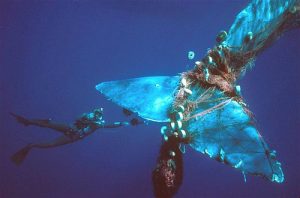Ocean pollution has a large impact on the whales that fill our oceans. Most research has focussed on pollution involving oil spills and the addition of plastics to the ocean, but the concept of noise pollution has been relatively ignored until the past few decades. Recent research suggests that excessive noise may even lead to hearing loss in whales, and cause stress that impacts their reproductive success. The question still remains: How much does noise pollution impact wildlife? And is it as dangerous as chemical pollution?
Noise pollution refers most commonly to the sound produced by cargo ships, seismic research, wind turbines and pile driving, since the noise they produce has the greatest effect on marine wildlife. Smaller boats and jet skis produce sound at a higher frequency that doesn’t impact marine wildlife as much.

Cargo ship – A large source of noise pollution
Whales rely on hearing to navigate and communicate as much as we rely on our ability to see. Beluga whales use a technique called echolocation to navigate using sound. Male humpback whales sing long and complex songs to impress potential mates. When large amounts of noise pollution interrupt the sound that whales use to communicate with each other, they can get lost or separated from their family. Noise pollution can also interfere with the mating of humpback whales if other whales can’t hear a male humpback’s song.
Chemical pollution of the ocean, which often occurs through oil or chemical spills, has a huge impact on whale health, since whales ingest whatever chemicals as added to the ocean. Whales can develop chronic health problems or even die from chemical and oil spills. Accumulated plastics or gear that isn’t “whale-safe” often leads to entanglements and injures whales, as well as death. Noise pollution on the other hand, can’t be linked to individual deaths of whales, but its impact on their reproduction is significant.
Even though the chemical pollution kills whales, while they are living, they are still able to reproduce and contribute to furthering the species. Noise pollution has the potential to impact living whales and decrease their ability to reproduce. Without reproducing, the whales can’t help their species develop, so noise pollution has the potential to be more problematic than chemical pollution when it comes to the impacts on whales.
-Sydney Inthof


